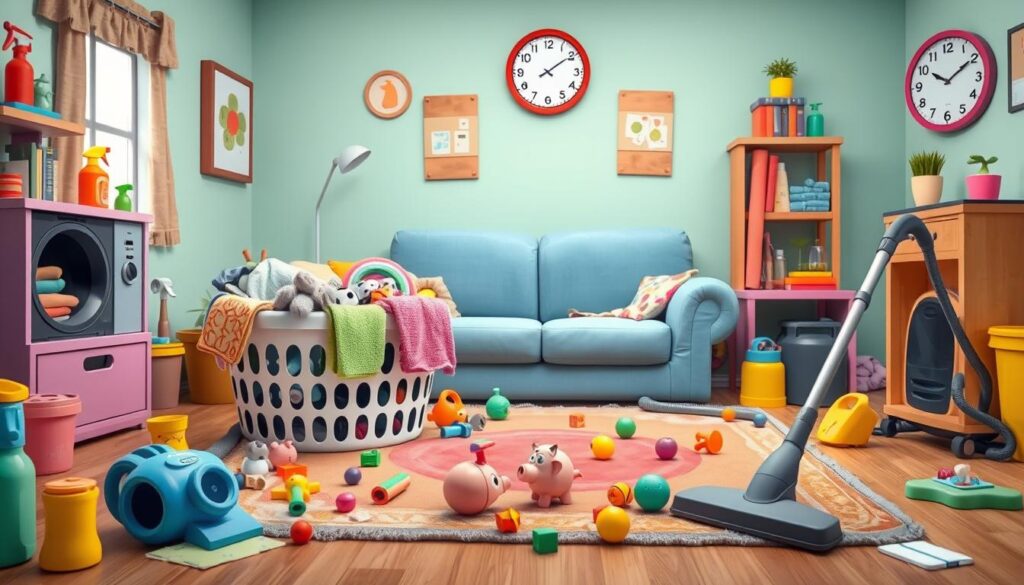How to Stop Nagging & Get Kids to Do Chores

Are you tired of always asking your kids to do their chores? Do you feel stuck in a cycle of asking over and over, getting more and more frustrated? You’re not alone. Many parents face this issue, but there are ways to stop nagging and get your kids to help without always asking.

Key Takeaways
- Nagging and yelling don’t work well and can make kids ignore you.
- Stress from work, money, and family life can make parents nag more.
- Kids get used to hearing the same thing over and over, so we need to talk differently.
- Changing how we talk and act can make kids respond better.
- It’s important to be clear about what’s expected and what happens if they don’t do it.
The Ineffectiveness of Nagging and Yelling
We’ve all nagged our kids to do their chores, but it often doesn’t work. Nagging and yelling might seem like good ways to get kids to listen. But, research shows they usually don’t work well.
Why Nagging Doesn’t Work
Nagging shows we don’t trust our kids to do things on their own. It can make them ignore us more and be more stubborn. They learn to wait for us to remind them instead of doing things by themselves.
Breaking the Vicious Cycle
To stop nagging and arguing, we need a new way to talk to our kids. We should be clear about what we want, set rules, and show them how to behave. Doing this will help our kids learn and follow rules better.
By fixing our own issues and letting kids take charge of their tasks, we can make our homes more peaceful. This helps our kids grow into independent and successful adults.
“Listening to children and understanding the root cause of their reluctance can lead to more effective communication.”
Focus on One Chore at a Time
Getting kids to do chores without nagging means focusing on one task at a time. Trying to change too many things at once can overwhelm everyone. By focusing on one chore, like putting dirty clothes in the hamper, we can make things clear and help the child get into a habit.
Experts say kids under 5 can start with simple chores like putting toys away and picking up clothes. Kids with focus issues do better with tasks broken into steps. Giving a timeline for chores helps kids manage their time better.
To help your child succeed, explain the chore and what you expect at the end. Use music or timers to keep them on track. Having a regular schedule for chores helps them plan and look forward to it.
Kids aren’t ready for working alone until they’re about 8 years old. Some kids might be ready a bit earlier, others later. Just remember to be patient and set realistic goals for your child.
By focusing on one chore at a time, changing habits slowly, and setting realistic expectations, you can teach your kids responsibility and independence. This method works well for many parents and can make your home more peaceful.
How To Get Kids To Do Chores Without Nagging
It’s important to stop nagging and yelling about chores. Talk calmly with your kids about the new way of doing things. Explain the rules and what everyone needs to do.
Explain the New Approach
Be clear about what you expect and what happens if they don’t do it. This new way is about setting clear expectations and being accountable. Don’t nag or yell, as it can make things worse.
Set Clear Expectations and Consequences
Explain what each child needs to do and what happens if they don’t. Use consequences that fit their age, like losing screen time or having no friends over. Always stick to these rules so kids know you’re serious.
This new way stops nagging and makes your home a place of responsibility and accountability. It helps your kids learn important life skills and makes your family work better together.
“According to Dr. Marty Rossman, participation in household tasks at the age of three or four is a strong predictor of young adults’ success in their mid-20s.”

The aim is to help your kids be independent and disciplined with clear expectations and consistent consequences. Don’t nag or yell. With patience and creativity, you can make your home a place where everyone helps and is proud of their tasks.
Lead by Example and Teach Them
As parents, we shape our children’s behavior and responsibility. To get kids to do chores without nagging, lead by example and model the behavior we want them to have. When kids see us doing household tasks, they’re more likely to do the same.
To teach responsibility and life skills, involve your kids in chores. Explain what you’re doing as you work. This shows them the steps and reasons behind each task. With guidance and support, they’ll get better at doing chores.
Model the Behavior
Kids copy what they see. If you want them to help with chores, show them you do it too. By modeling the responsible behavior we want, we encourage them to do the same.
Provide Guidance and Support
Young kids or those who struggle with organization might need extra help. Walk them through the process step-by-step. Encourage them and work together. This guidance and support builds their skills and confidence.

“Children learn more from what you are than what you teach.”
– W.E.B. DuBois
By leading by example and teaching responsibility, we help our kids learn important skills. This way, they feel they own their tasks. It also makes family life more cooperative, helping them succeed in the long run.
Conclusion
Getting kids to do chores without always reminding them takes time and effort. But it’s really important. We need to set clear rules, show them how it’s done, and help them when they need it. This way, they learn to help out and become independent adults.
We can make our kids help out by focusing on one task at a time. We should show them how it’s done ourselves. And we should praise them when they do a good job. This helps them learn important skills like managing their time and solving problems.
Teaching kids to do chores without nagging is a slow process. But it’s very important for their future. With patience and support, we can make our homes a place where everyone works together. This helps our kids grow into responsible adults.



